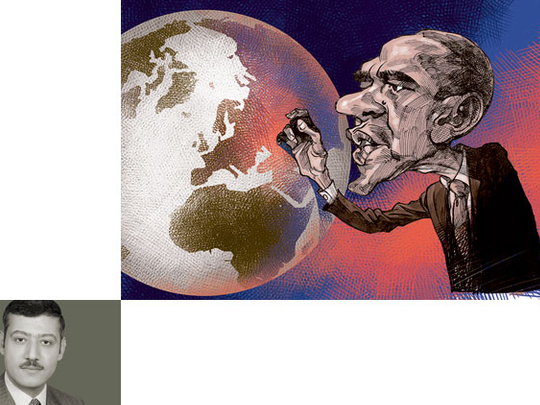
Most analysts believe that US President Barack Obama’s foreign policy in the four years of his second term will be preoccupied with the Asia-pacific region and the perceived threat posed by China.
Indeed, presenting China as the No 1 global challenge to US strategic and economic interests is by no means a novel trend in the US political discourse. In fact, since the end of the Cold War, China has been introduced to the US public as the enemy of the 21st century. Although the Chinese government has since embraced capitalism as an economic system, Washington remains sceptical. China’s poor human rights record, its totalitarian regime and conservative culture have helped portraying it as the anti-thesis of western political and social values.
Among many other things, American analysts have been complaining about China holding so much of US foreign debt, “reckless” environmental attitude, support for “authoritarian” regimes in Burma, Sudan, and Iran, and aggressive corporate practices. A major bone of contention has in recent years been China’s undervalued currency, which harms US trade balance.
The US has also expressed concerns about China expanding its zone of influence into contiguous zones, including the Russian far east, Mongolia, Central Asia, and Southeast Asia. Beijing’s attempts to secure a foothold in Latin America, East Africa and parts of the Middle East have set alarm bills in Washington.
Indeed, China possesses most of the Great Power’s attributes. Its economic potentials are great. It is the second largest world economy and the largest world exporter. China is the biggest holder of hard currency amongst the great economic powers with a reserve that exceeds $2.7 trillion (Dh9.90 trillion).
Geopolitically, China’s size matches that of the US and it is a home to one-fifth of the world’s population. Its expanding industrial power has made it the second largest global consumer of oil after the US. Militarily, China’s expenditure has more than tripled over the past five years. It is estimated that Beijing spends up to $110 billion on military hardware, second only to the US. Its ability to project naval power in the East and South China Sea has been particularly alarming for US strategists.
Yet, all this does not make China an existential threat for the US, as many Americans would like to argue. At the best, China can limit America’s access to the Strait of Taiwan. In addition, China’s geographic growth is more an expression of a situation ‘going back’ to normal than it is of some power that means to do harm.
Moreover, Chinese leaders have not historically been a proselytising power. They are not a missionary power like the US or the former Soviet Union either. They are not trying to promote any particular system of government for no other reason except that they have no appealing one. Rather, their main concern is to search for mineral wealth and oil and energy in order to raise the standard of living of one-fifth of humanity. This makes them a realist power that might pose a challenge for the US to deal with, but nothing more.
China does not seem to be interested in any form of conflict with the US. It is also smart enough to avoid the sort of arms race that destroyed the Soviet Union. China has never stated that it seeks to contest the US for global hegemony or attain a superpower status. At best, its intentions and potential can make it a regional hegemon.
But even here the Obama administration is destined to have tense relationship with China. The very logic of the Obama Doctrine — the Obama administration’s definition of US foreign and security interests — would wittingly or unwittingly lead to confrontation with China.
“The future of politics will be decided in Asia, not Afghanistan or Iraq, and the US will be right at the center of the action,” Hillary Clinton, Obama’s outgoing secretary of state, who was entrusted with defining the new US foreign policy strategy, wrote in Foreign Policy magazine in November 2011.
“In the next 10 years, we need to be smart and systematic about where we invest time and energy, so that we put ourselves in the best position to sustain our leadership, secure our interests, and advance our values. One of the most important tasks of American statecraft over the next decade will therefore be to lock in a substantially increased investment — diplomatic, economic, strategic, and otherwise — in the Asia-Pacific region”, Clinton said.
Dr Marwan Kabalan is the dean of the Faculty of International Relations and Diplomacy at the University of Kalamoon, Damascus.












